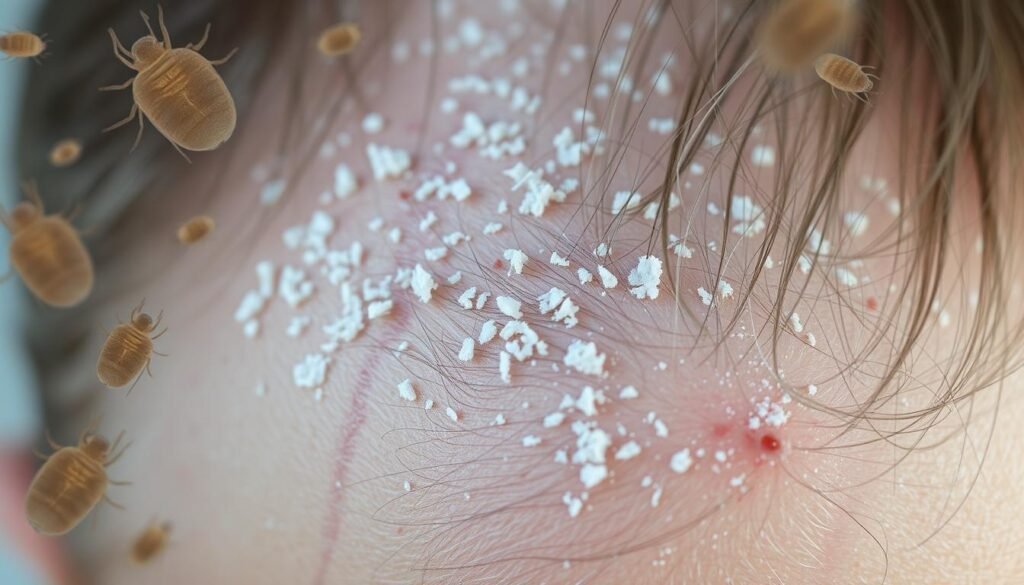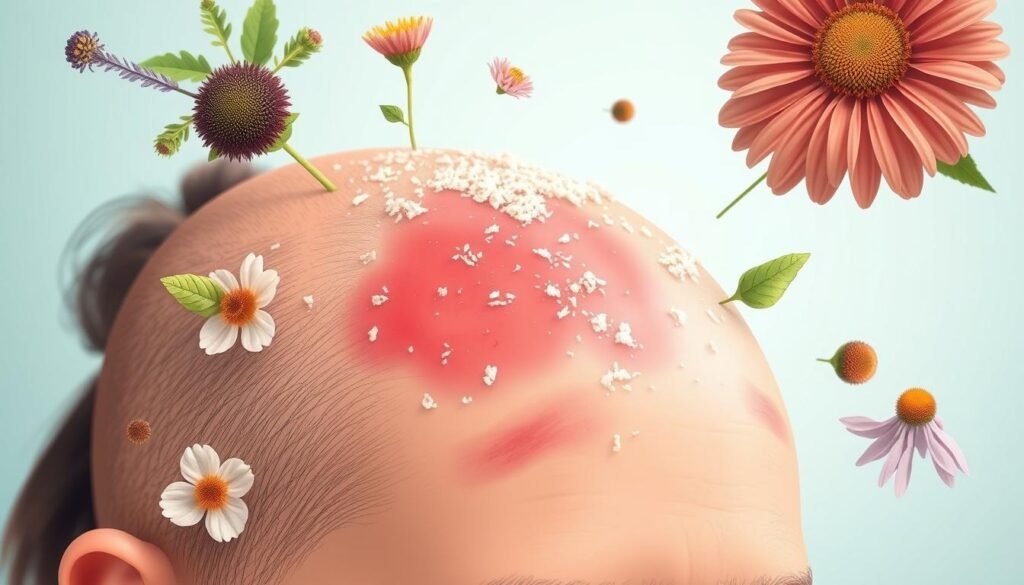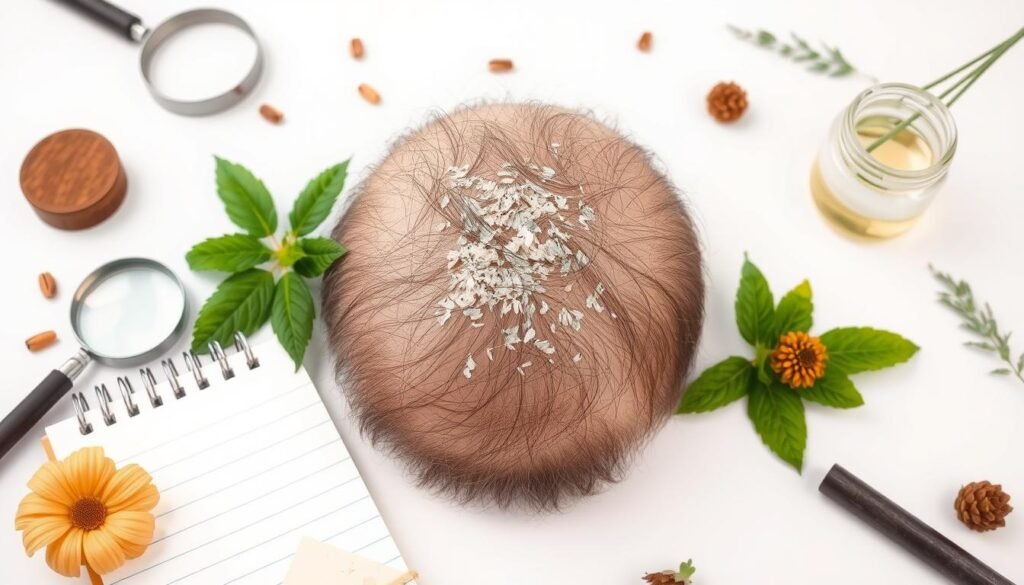About one out of five people deal with dandruff. This common issue can get worse due to allergies. Dandruff isn’t just about flaky skin; it can show if you have allergies needing special treatment. By knowing how allergens affect the scalp, we can better manage dandruff. This piece looks into allergies and dandruff, covering causes, signs, and how to fix scalp health.
Key Takeaways
- Approximately 20% of people experience dandruff at some point in their lives.
- Identifying the type of allergic reaction can significantly aid in finding effective treatment options for dandruff.
- A dermatologist can diagnose dandruff through a straightforward visual examination.
- Common allergens can lead to contact dermatitis, which often manifests as dandruff.
- Healthy lifestyle choices play a role in dandruff management and prevention.
- Medicated shampoos containing specific ingredients can effectively treat dandruff caused by allergic reactions.
- Understanding the triggers of dandruff is crucial for effective management and treatment.
Understanding Dandruff and Its Causes
Dandruff is a common scalp condition marked by dead skin flakes. It can start in young adulthood and last into middle age. People with oily hair, especially men, tend to have it more. This is due to increased oil production during puberty.
The main cause of dandruff is often underlying skin conditions. Seborrheic dermatitis is a big culprit, affecting almost half of adults worldwide. Dry dandruff happens due to not enough moisture, while oily flakes are from too much yeast. Products and the environment can make it worse.
To manage dandruff, spotting the symbols is key. Look for yellow or white flakes and an itchy scalp. Flakes can also appear on eyebrows and beards. Risk goes up with certain conditions, like Parkinson’s disease or a weak immune system.
Good scalp care is essential for fighting dandruff. Washing your hair often with special shampoos helps. It’s also important to use soft products and moisturize properly.
What Are Allergic Reactions Causing Dandruff?
Allergies can trigger dandruff. Hair care products and the environment carry common allergens. When exposed, the immune system may react too much. This leads to more skin cells being made. Symptoms like flaky skin and itchiness appear, showing dandruff or scalp allergies.
It’s key to see the effect of allergies on the scalp. Dandruff mainly shows as yellow flakes and an itchy scalp. But, allergies can cause redness and more irritation. Knowing the difference is crucial because the treatments can be very different.

If symptoms keep up, looking at your hair care routine helps. New products might have allergens that make scalp allergies worse. It’s important to know how dry scalp and dandruff differ. A dry scalp may not have flakes but can still feel uncomfortable like dandruff does.
| Condition | Common Symptoms | Typical Triggers | Treatment Options |
|---|---|---|---|
| Dandruff | Yellow flakes, dry scalp, limp hair | Excess oil production, yeast overgrowth | Over-the-counter medicated shampoos |
| Scalp Allergies | Red bumps, irritation, dryness | Hair care product ingredients, environmental factors | Elimination of allergens, topical treatments |
Seeing a skin doctor is a good move when symptoms don’t go away or get worse. You can find help and treatments, like those for seborrheic dermatitis, online. Check out medical guidance on seborrheic dermatitis for more info. Knowing all about allergic reactions helps manage dandruff better, for a healthier scalp and more comfort.
Common Scalp Allergies and Their Symptoms
Many people have scalp allergies that cause annoying symptoms. These allergies come from contact dermatitis or atopic dermatitis. Knowing about them helps manage them well.

Contact dermatitis happens when you touch allergens in hair products. Things like fragrances and chemicals in shampoos can cause it. You might get redness and itching fast, sometimes in minutes. Atopic dermatitis symptoms show up after a day or so.
People with atopic dermatitis on their scalp see flaking, dryness, and redness. These signs can look like dandruff. If you have oily skin or similar issues, symptoms could get worse. It’s key to know how these allergies differ.
A table below shows common scalp allergies and their symptoms:
| Condition | Symptoms |
|---|---|
| Contact Dermatitis | Redness, swelling, itching, irritation |
| Atopic Dermatitis | Dryness, flaking, inflammation, itchiness |
Knowing these symptoms is the first step in managing scalp problems. Watching how your skin reacts to hair products is critical. The connection between scalp allergies and dandruff is important. Using resources like guides on scalp irritants can be very helpful.
Quick treatment improves scalp health. This helps people enjoy their hair care routine more.
Dandruff Triggers: From Food to Environmental Allergies
Dandruff can affect your comfort and confidence greatly. It’s important to know what causes it. Foods you’re allergic to can make your skin dry and irritated. This can make your scalp flaky.
Seasonal changes and pollutants also increase dandruff. It shows why we must watch how nature affects our skin. External elements like pollen can make scalp problems worse. This leads to discomfort.
Not getting enough certain nutrients also triggers dandruff. Your skin needs omega-3 fatty acids and B vitamins. Without them, your scalp can become more prone to dandruff. You can fix this by eating the right foods.
Some hair care products have harsh chemicals. These can make your scalp react badly. Knowing what your scalp can’t handle helps you avoid dandruff. It’s all about understanding what bothers your skin.
It takes effort to find and manage what causes your dandruff. You need to consider food allergies and the air around you. Both affect how healthy your scalp is. This awareness is key to better scalp health.
| Dandruff Triggers | Description |
|---|---|
| Food Allergies | Reactions to specific foods that manifest as dry, flaky skin. |
| Environmental Allergies | Allergens such as pollen and pollution affecting scalp health. |
| Nutritional Deficiencies | Lack of essential nutrients like omega-3s leading to irritation. |
| Hair Care Products | Harsh chemicals in shampoos and treatments causing skin sensitivity. |
Diagnosing the Underlying Causes of Dandruff
To treat dandruff right, we must know what causes it. A dandruff diagnosis begins with a thorough scalp examination. This step is crucial. It tells if allergies, seborrheic dermatitis, or yeast overgrowth is to blame.

It’s crucial to tell these conditions apart with a medical assessment. For example, oily skin can welcome the Malassezia fungus, leading to dandruff. Those with seborrheic dermatitis, which pairs with oily skin, are more prone to flakes. Hair-care products can also trigger allergic reactions, worsening dandruff.
Sometimes, figuring out the exact cause is hard. Itching and flaking are common signs that need attention. This is where a professional steps in. They’ll look at your medical history, risk factors, and health conditions. All of this helps in finding the root cause of dandruff.
| Condition | Impact on Dandruff |
|---|---|
| Oily Skin | Increases risk due to Malassezia overgrowth |
| Dry Skin | Causes smaller flakes, often in cold climates |
| Contact Dermatitis | Triggered by allergens or irritants from products |
| Seborrheic Dermatitis | Commonly associated, especially in those with oily skin |
| Underlying Health Conditions | Increases susceptibility (e.g., HIV, Parkinson’s) |
Figuring out the specific cause of dandruff is the key to effective treatment. It helps relieve symptoms and prevents more irritation. By understanding what’s happening, we are closer to a clear scalp and feeling more comfortable.
Allergic Reactions Causing Dandruff: Treatment Options
When allergic reactions cause dandruff, special treatment methods are used. People often get dandruff because they are sensitive to certain hair care products or things in their environment. To manage this, treatments focus on antifungal treatments, medical solutions, and picking the right topical treatments carefully.
Identifying Suitable Antifungal Treatments
Antifungal treatments reduce dandruff by fighting the Malassezia yeast growth. Shampoos with ketoconazole, zinc pyrithione, and selenium sulfide are suggested. These ingredients help lessen flaking and itching, making the scalp healthier. It’s key to leave these shampoos on the scalp for a minimum of five minutes to get the best effect. Switching between different antifungal shampoos can also greatly improve the situation.
Medical Interventions for Severe Cases
When dandruff doesn’t improve with regular products, doctors may recommend medical dandruff treatments. They often use topical steroids to calm inflammation and itchiness from allergic reactions. These treatments aim to reduce dandruff discomfort. Also, immunotherapy solutions like those from Curex offer personalized treatment options. Having a treatment plan made just for you can greatly increase how well dandruff is controlled, especially when allergies are the cause.
Lifestyle Changes to Prevent Dandruff
Making lifestyle changes is key to stopping dandruff. Eating right helps keep your scalp healthy. Adding zinc and B vitamins from foods like oysters, eggs, and dark chocolate is good for your scalp.
Lowering stress helps fight dandruff too. Try relaxing with meditation, yoga, or exercise. These activities improve your scalp’s health by keeping you calm.
Pick a hair care routine that fits your scalp. Use the right shampoo, including ones with zinc pyrithione or salicylic acid. Changing your shampoo regularly helps avoid resistance and keeps dandruff away.
Use less hair styling products to prevent buildup. Too much sun can harm your scalp, especially if your skin is sensitive.
Want to know more about diet and dandruff? Check out this resource. Natural remedies like coconut oil or apple cider vinegar might also help with dandruff.
Using Allergy Immunotherapy for Better Results
Allergy immunotherapy is a new way to help with allergic reactions causing dandruff. It uses desensitization treatments to make the body get used to allergens. By doing this little by little, people can see a big change in their allergy symptoms, like those on the scalp.
The Curex specific treatments are made just for you. Studies show this method works well for dandruff from allergies. A report found that using special medicines with therapy could lower nasal issues. This shows how important it is to have treatment that fits your needs.
Allergy shots are often given to fight allergies. They do this by putting a little bit of the allergen into your body. These shots might cause some minor reactions, but big problems are rare. If you have asthma, you need to watch out for bigger reactions. Usually, any trouble goes away in a couple of days.
The benefit of allergy shots might not last forever. That’s why it’s good to look at other options like Curex offers. They keep an eye on how you’re doing and make changes as needed.
Using gentle hair care products is a good partner to allergy immunotherapy. Keeping your scalp clean and away from allergens is key in managing it all.
Working with allergy experts can help you a lot. They can test to find out what you’re allergic to and how to treat it. This plan doesn’t just stop the symptoms. It looks for ways to make your scalp healthier for good.
| Treatment Type | Description | Benefits |
|---|---|---|
| Allergy Immunotherapy | Gradual exposure to allergens | Long-term relief, personalized care |
| Desensitization Treatment | Small doses of allergens over time | Increased tolerance, reduced symptoms |
| Curex Specific Treatments | Customized management plans | Convenience, targeted therapy |
| Allergy Shots | Injection of allergens | Established treatment, minimally invasive |
Conclusion
Allergic reactions can greatly affect dandruff which many people have. It’s important to know what causes your dandruff. Many hair products have stuff like decyl glucoside and paraphenylenediamine. These can make your scalp worse by irritating it and speeding up skin cell growth.
Treating dandruff well can make your scalp healthier. Washing your hair often, avoiding things that irritate your scalp, and eating right help a lot. Using products with antifungal agents or essential oils can also make a big difference.
If you’re dealing with dandruff, getting help from a pro is a smart move. They can offer treatments and tips that really work. By following their advice, you can see a big improvement in your scalp health and how you feel overall. For extra info on dandruff and how to deal with it, check out this resource.